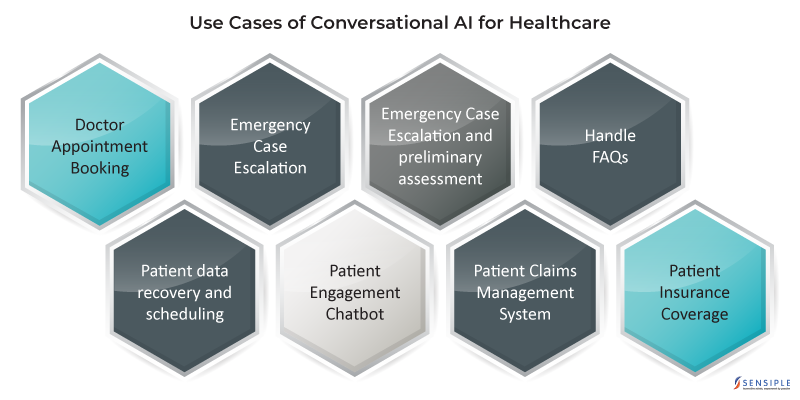
How Can Conversational AI Help the Healthcare Industry?
The scene at major healthcare facilities today is vastly different from what it was five years ago. Gone are the days when you had to fill out forms and wait for twenty long minutes while the receptionist manually entered your information and directed you to the right waiting room. Now, as soon as you enter the facility, a bot installed in an interactive kiosk with a large touchscreen display greets you. It asks you a series of questions in a natural language conversation and within just two minutes, it has gathered all the necessary information for your medical appointment, and lets you proceed to your doctor's room.
Conversational AI has made it possible to streamline the patient intake process, reduce waiting times, and significantly improve the overall patient experience in the healthcare industry. With its ability to comprehend natural language, carry out conversations, and learn from interactions, Conversational AI has immense potential to enhance patient care and medical services. It can help healthcare professionals deliver accurate diagnoses, enable more personalized treatments, and drastically improve patient outcomes.
In this blog, we'll explore the various ways in which Conversational AI can help the healthcare industry, from providing personalized patient care to reducing administrative burdens.
How Conversational AI Benefits the Healthcare Sector
Here's how conversational AI can help the healthcare industry and improve patient care.
24/7 Availability
Conversational AI can be available 24/7 to answer patient questions and provide information about their health. Patients can ask questions about symptoms, medication, treatment options, and more without waiting for a doctor's appointment or office hours. This capability improves the patient experience and reduces the burden on healthcare providers.
Quick and Accurate Diagnosis
Conversational AI can help healthcare providers diagnose patients more quickly and accurately. By asking patients about their symptoms and medical history, conversational AI can provide preliminary diagnoses, suggest appropriate treatment options, and help doctors save time and make more informed decisions.
Remote Monitoring
Conversational AI can also be used for the remote monitoring of patients. Patients can report their symptoms and vital signs through chatbots, and healthcare providers can monitor their condition and intervene if necessary. Remote monitoring can benefit patients with chronic conditions or those who live in remote areas.
Personalization
One of the most significant benefits of conversational AI is its ability to personalize interactions. Chatbots can use data to tailor conversations to each patient's specific needs. They can analyze patient data to provide tailored medication, treatment, or general health advice recommendations. Conversational AI can even help patients manage chronic conditions by reminding them to take their medication or providing guidance on lifestyle changes.
Improved Patient Engagement
Conversational AI can help improve patient engagement by providing personalized recommendations and reminders. Patients can receive notifications about upcoming appointments, medication reminders, and suggestions for healthy lifestyle choices. Patient engagement helps control their health more and reduces the likelihood of hospital readmissions.
Efficient Appointment Scheduling
Conversational AI can also help healthcare providers manage their appointments more efficiently. Patients can book appointments and receive reminders through chatbots, reducing the workload on administrative staff. Appointment scheduling lets healthcare providers optimize their schedules and reduce patient wait times.

Use Cases of Conversational AI for the Healthcare Industry
Conversational AI now powers many critical use cases that significantly impact both caregivers and patients. Drawing on Sensiple's expertise in designing and implementing Intelligent Virtual Assistant (IVA) solutions for healthcare providers, we've identified several use cases where this technology can be employed to assist medical professionals in treating their patients with increased efficiency and care.
Doctor Appointment Booking
Chatbots or voice bots can provide patients with necessary information during a conversation, approve, defer, or cancel appointments, and facilitate the entire transaction. They do it in a natural conversational manner making it as easy as talking to an assistant. Patients can initiate a series of chats and secure a slot for their appointment. Additionally, the conversational interface can be used to search for physicians based on their specific disciplines during the appointment booking process.
Emergency Case Escalation and preliminary assessment
The step-by-step diagnostic tool can guide patients with minor health symptoms and point them to the need for emergency escalation and care. Healthcare conversational AI also focuses on screening patients and triaging treatment in swamped healthcare institutes. Bots collect all patient symptoms data and are instructed to take proper action based on the seriousness of the patient's condition.
Handle FAQs
The FAQ section, dedicated to answering general queries has become a common chatbot feature through all website homepages. This feature is helpful for users to find information relevant to payment tariffs, documents needed to receive treatment, insurance coverage, and more.
Patient data recovery and scheduling
The use of conversational AI in the healthcare sector is more comprehensive than just helping patients. Chatbots help healthcare professionals recover data on discharged patients, admit new patients, and get easy access to patients' medical records. It empowers the care teams to offer personalized treatment, making the patient visit productive. AI chatbots aim to cater to healthcare centers' needs and let patients book appointments without human intervention. It also deals with unlimited user queries freeing up the staff to handle many queries.
Patient Engagement Chatbot
Post-treatment is a crucial phase where conversational AI can keep patients engaged. Patient engagement chatbots check in on patients' well-being and periodically track their vitals after treatment and advises on preventive measures such as taking pills on time. It dramatically helps the healthcare staff reduce their burden so that they can spend more time on critical patients in the hospital.
Patient Claims Management System
Medical claims insurance often deteriorates the business productivity and efficiency of healthcare billing staff. There are also possibilities for human errors. Conversational AI bots fasten up your customer service and lead generation process. Chatbots can deal with multiple customers while providing accurate claim processing service and taking the customer experience to a higher level.
Patient Insurance Coverage
Health Insurance coverage bot educates customers on health insurance plan benefits like free health check-up coupons, emergency ambulance cover, and wellness programs. Chatbots can also provide a personalized quote and guide them to opt for the best insurance plan to cover care expenses in case of a planned or emergency hospitalization.
The Future of Healthcare with Conversational AI
Conversational AI has the potential to revolutionize the healthcare industry, improve patient outcomes and reduce the burden on healthcare providers. As technology advances, we can expect to see even more innovative applications of conversational AI in healthcare.
At Sensiple, we recognize that Conversational AI is critical for delivering personalized, proactive, and intuitive conversations that satisfy customers. Our helpdesk and Intelligent Chatbot solutions integrate technology, people, processes, information, and service into a seamless conversational experience that saves time for both patients and employees. Interested in learning more about how Conversational AI can transform your service delivery? Get in touch with us today to schedule a demo.


